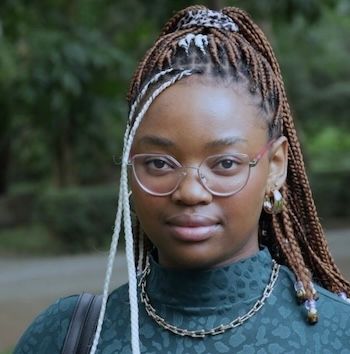Ayakha Melithafa

Summary: Since she was a teenager, Ayakha Melithafa has fought environmental injustice through clean-up events, petitions, and awareness-raising campaigns in Cape Town and beyond. Founder of the Ayakha Melithafa Foundation, she runs the Botho Pele climate project, going to schools around South Africa to educate high school students on the risks and opportunities presented by the climate crisis. Melithafa has given up her own schooling for now in order to pursue her cause for climate justice. She is often mocked by some of her peers for “advocating for wrong priorities”. But this does not deter her from continuing her activism: “It is our duty to make sure that our future and that of future generations is safe.”
Profile: Ayakha Melithafa’s turning point came as a teenager after realising the devastating effects of a drought that hit her community in 2016. Her mother, a small-scale farmer, was one of the victims.
“I saw a problem,” she recalls, “and decided to act by advocating for urgent climate justice in my country to make sure no African child is left behind in the just transition to 100% renewable energy.”
Hailing from Khayelitsha, an under-resourced community in the Western Cape, Melithafa believes that young people must rise to challenge policies that hamper the environment because they are the ones most affected by climate change—now and in the future. Today, she leads the Botho Pele climate project, an awareness-raising and advocacy platform. With her colleagues, Melithafa goes to schools around South Africa to educate high school students about the climate crisis. She also participates in community meetings with young people, emphasizing their responsibility to safeguard the environment and to hold their leaders accountable for doing just that. She has also spoken on various media with similar messages.
A public representative of the African Climate Alliance, a youth-led climate advocacy and pressure group, Melithafa, with the help of her colleagues, organises protests in Cape Town. She continually questions the government about its lack of appropriate actions. One example: In 2020, at a National Youth Development Agency youth meeting, Melithafa asked President Cyril Ramaphosa what his government was doing to tackle the country’s over-reliance on coal, when wind and solar power are viable alternatives. The youngest commissioner on the Presidential Climate Commission in South Africa, she has called for an immediate moratorium on the extraction of coal, oil, and gas in South Africa.
In September 2019 Melithafa joined other teenage climate activists in New York to present a landmark grievance to the United Nations about governments’ lack of action on climate change. She joined Greta Thurnberg and others from across the world to petition the UN Committee on the Rights of the Child to hold five of the world’s leading economic powers accountable for inaction on the climate crisis.
Being a young woman means that your opinions are sometimes not valued. Melithafa responds to this: “Sometimes I feel like I am being used as a token. But I have seen my contributions being implemented—for example, making community engagement meetings more accessible to the youth by having them at times when they are back from school. I am also happy that they are broadcast live on Facebook and on local radio stations. Since our leaders are failing us, we really should try to be active citizens and participate in these spaces as much as we can, so we can hold them to account, because no one is coming to save us.”
Melithafa’s work has not come without sacrifices. She postponed her formal education in order to pursue her advocacy. Some of her friends told her that “global warming and climate justice issues are white-people and first-world issues.” And her life is often threatened when she goes out into the public: “There are always safety concerns when we go to protest with other young people because things can get out of hand. There are also safety concerns when visiting different areas . . . we do not know if we might get robbed or not, but that does not stop us from continuing our work.” In addition, given the traditional and conservative society where she was raised, it is taboo to tell elders what to do, but Melitihafa has broken that barrier many times. She maintains that it is her duty and that of many of her peers to “hold leaders accountable for continuously putting our lives at risk by not doing enough about climate change.”
“We understand the risks,” she says, “but we are willing to work regardless of them. I will never surrender activism because I have seen how much of a difference the work I do has made. We are facing a climate crisis that is affecting our lives, and it's important that everyone plays their part in making sure that our future and the future of the next generation is safe and sustainable.”
